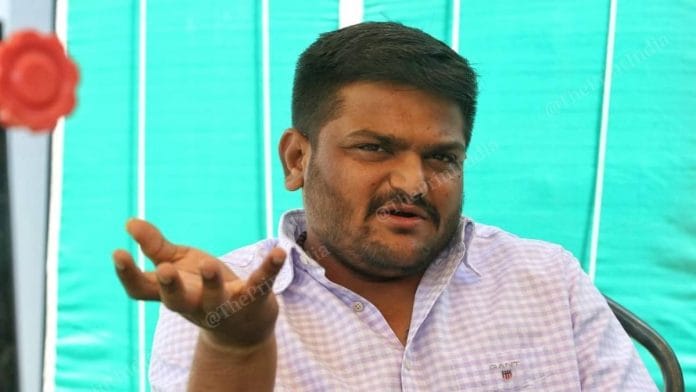New Delhi: Patidar leader Hardik Patel is less than happy with the Congress.
Since joining the Congress in 2019, Patel, who rose to prominence with the 2015 Patidar protests for reservation, has made no bones about his feelings with Congress. So much so that he recently edited his Twitter bio earlier this month to drop the party’s name.
“I have 32 cases against me,” he told ThePrint in an interview. “As far as Congress is concerned, I have never expected anything from them. And I don’t care. I have the support of people and that’s what matters. But honestly, not everyone in the Congress has given me support. But I have no hard feelings against them.”
As Gujarat elections draw close, reports emerge of his growing disenchantment with his party. He told ThePrint that he’s gearing up to fight the elections but whether it will be as a Congress candidate is still up for discussion.
“The court has given me the nod to fight elections, so I will fight in the Gujarat elections this year,” he said. “Right now, I’m with the Congress. Rest is up for discussion.”
Gujarat will hold assembly elections later this year.
Despite giving mixed signals and even in his displeasure, however, he’s careful to avoid taking any names, either of Rahul or Sonia Gandhi.
“Congress is like my family. All the senior advocates in the Congress party have always supported me. Even Priyanka Gandhi has always supported me. And if she has supported, I believe the party has my back,” he told ThePrint.
Two of the 32 criminal cases against him are for sedition — section 124A of the Indian Penal Code (IPC) — a law that the Supreme Court put on hold only Wednesday.
The judgment meant that the court also put on hold all pending trials, appeals and proceedings under the provision, including the cases against Patel until the central government reviewed the colonial era provision that has long been called draconian.
Patel was arrested in 2020 for sedition after the 2015 Patidar agitation in Gujarat — Patel’s home state — turned violent, killing at least 10 people. He has since been released on bail.
Also Read: Will join Congress close to polls, need to break ‘illusion’ of Gujarat model, says Mevani
‘Betrayal’
Patel said he felt a sense of betrayal after the sedition charges.
“It is understandable for any government to suppress a people’s protest against their decisions. But it is unacceptable for the government to charge its citizens with laws made for terrorists,” he told ThePrint.
“I am Gujarati and I have a different kind of love for the people of my state, but, today I have 2 cases of sedition against me in my own state as if I have conspired against my own people. I spent several months in prison for speaking up for my people’s rights. One of the sedition chargesheets against me says that I said in a rally that if the government doesn’t listen to us, we should follow the path of Bhagat Singh.”
He and 18 others also face charges of rioting, unlawful assembly and criminal conspiracy over the Patidar protests.
He claims although he never imagined that protests for rights could turn into violence. For him, the fight was personal.
It started when his sister failed to qualify for a state government scholarship in 2015 but her friend got the same scholarship through the quota for Other Backward Classes even though she scored lower marks.
“That was when I realised the need to fight for reservation for Patidars,” he said.
He launched the protest to get Patidars reservation under the OBC category, he said.
‘Outdated law’
Sedition is an outdated and draconian law that should have no place in a democratic society, he said.
“Sedition was brought in by the British to suppress our independence struggle,” he said. “The ones who implemented Sedition don’t have sedition law in their own country but we still have the colonial era law. The law shouldn’t apply to those fighting for their rights within the country’s law.”
“A citizen must question the government everyday, criticise them strongly for their wrong actions. But we also must unite against anyone working against this country.”
The last few years have seen the law being used as a political tool, he said.
“If the government of India feels that they will scare the people of this country with sedition cases, they should learn from the past,” he said. “They know that earlier governments made the same mistake, and if they repeat it, they’ll see more rebellion. We held India’s flags in our protest, we love our country, we love its people, we’re not government haters, we just want the people in power to listen to us.”
Did the charges make him lose faith in the judicial system?
“Police filed 6,000-7,000 pages charge sheets against me. But I trust the judiciary of our country,” he said. “I’m sure that in a democratic country like ours, courts will give us justice because it’s our right to protest against the government’s actions and ask for what is rightfully ours. People have no option but to protest for their rights.”
Patel believes that police cannot be trusted with serious charges like sedition or Unlawful Activities Prevention Act .
“Police also have a major role in misusing the laws. I respect the police but often they are also under pressure from the government to register false cases,” he said. “The draft being prepared by the central government should take care of this part. There should be clarity about who can be charged with sedition.”
(Edited by Uttara Ramaswamy)
Also Read: Gujarat is no Delhi. Challenge goes beyond ‘development’—contesting Modi’s iconic image






